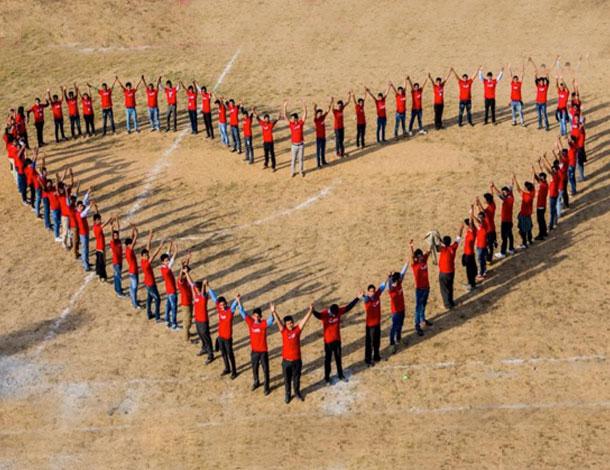Fluffy.
A luxury.
Something to address once the “real” issues have been addressed.
In the context of sexual reproductive health and rights (SRHR), the subject of pleasure remains a big taboo.
Yet many working in the field around the world are struggling to reach young people with vital information relating their sexual and reproductive health and rights. Is this because we are failing to take into account the motivations and desires of those we are trying to engage?
By focusing on technical solutions, service provision, on large-scale solutions, on the dangers of risky sex, we are trying to reach our prospective “clientele” using language - and in a manner - which excludes them.
Are we saying that people who live in certain societies aren’t interested in what sex feels like? Or that they are simply contracting STDs or getting pregnant without having sex at all?
Clearly this is not the case.
Which is why Love Matters, the organization I work with, is working hard to bridge this gap, and actually talking about the ‘squidgy sexy sex’ part. We primarily operate across the digital space, which enables us to circumnavigate traditional gatekeepers to Comprehensive Sexuality Education (CSE), using a combination of media, mobile technology and persuasive story telling to reach our target communities.
As such organizations are not physically present in the lives of the people we are trying to reach, the challenge is how to become a resource they actively seek and return to.
At Love Matters, we have discovered that “pleasure” can be a portal for wider engagement around sexual rights and education.
Since we began 5 years ago, we have had 50 million sessions, around 128 million page views, and gained over 3 million social media followers.

And guess what: a large percentage of people enter our site via a pleasure topic.
Far beyond fluffy, by being open and talking about pleasure across our platforms, we have successfully created a taboo-free zone where learning is possible without the fear of judgment.
And when that happens, we see that boundaries come down and people open up to conversations around potential harmful behaviours.
To the extent that a young woman in Cairo who was about to get married, was concerned that masturbation meant she was no longer a virgin. Our private social media channels were a safe space for her to ask questions and share pictures of her vagina.
To the extent that a young man in India who read about how unpleasant groping was from a woman’s perspective made him reflect on all the “bad stuff that he had done”.
He said that whenever he'd gotten a chance, he laid his hands on a girl or woman, or “touched his private parts against them in a crowded train or bus”. He said he now felt guilty and apologized for his behavior.
To the extent that a young woman in Kenya came to us when she found out her partner had been sleeping around and when she was trying to build up the courage to get tested for HIV. And when she was turned away from public services for being unmarried. And when she was finally diagnosed positive. She went on to publicly share her status on the community forum and is now active on our Kenya site advocating for others to be tested.
These are all very real examples.
These young people were at a decision-making crossroads and in need of information.
It is therefore important to use language that does not categorize, compartmentalize or judge, but instead offers a space for dialogue and understanding of the various options, better placing them to make well-informed decisions.
Because, for the most part, people do not likely see themselves as perpetrators of sexual violence or as human-rights abusers. Nor do they necessarily identify themselves as being “at-risk”. They do not categorize themselves as “marginalized”. And neither would these be terms they tap into a search engine.
When it comes to talking about sex and sexual pleasure, language is a powerful thing, often a way of reinforcing negative stereotypes and power imbalances.
Indeed, the complete absence of words to describe women’s pleasure in many regions where we work demonstrates how taboo this concept is: the current vernacular simply removes the possibility of discussing women’s pleasure in a positive or at least neutral way.
For example, when Love Matters launched our India site, there existed no word in Hindi for female masturbation in popular circulation, only male. There was a term in use in SRHR circles, but we were the first to introduce it as part of the online conversation for young people, normalizing the term and bringing it to a wider audience.
In Arabic, we needed to make sure that young Egyptian women would be able to find an image of a vulva with its parts named in Arabic: to get to know their bodies and imbue their genitalia with the power of a name. In Egypt, most textbooks do not show, let alone name, the parts of a woman’s vulva. As a result it’s common for women to not know where the clitoris is or recognize it in a picture, making it all the more difficult to talk about the effects of female genital cutting/mutilation.
Pleasure is not something to get to later on when everything else is sorted out: women knowing and understanding their pleasure and their right to pleasure is fundamental to their empowerment.
So it's time to go beyond the instrumental when it comes to women and SRHR. Let’s talk about human-beings as they are, as a whole, in all their living, breathing, sweaty, sexiness. Not as harbingers of disease or reproductive mechanisms, but as people.
About the author
Hannah is Lead Creative and Partner Strategist at Love Matters, part of RNW Media.
As a communications specialist and activist, she is passionate about exploring ways to instigate transformative change through storytelling, digital innovation and the arts.
